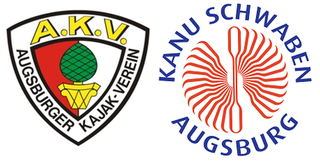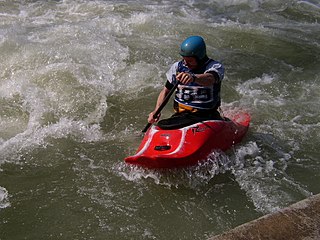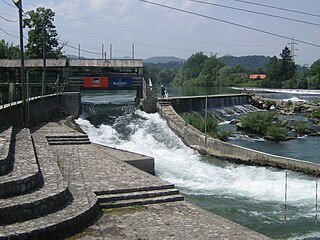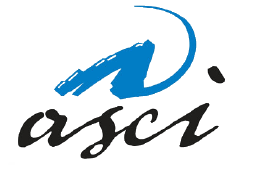
Canoeing is an activity which involves paddling a canoe with a single-bladed paddle. Common meanings of the term are limited to when the canoeing is the central purpose of the activity. Broader meanings include when it is combined with other activities such as canoe camping, or where canoeing is merely a transportation method used to accomplish other activities. Most present-day canoeing is done as or as a part of a sport or recreational activity. In some parts of Europe canoeing refers to both canoeing and kayaking, with a canoe being called an open canoe.

Whitewater kayaking is an adventure sport where a river is navigated in a decked kayak. Whitewater kayaking includes several styles. River running; where the paddler follows a river and paddles rapids as they travel. Creeking usually involving smaller, steeper, and more technical waterways. Creek boats tend to be short but high volume to allow for manoeuvrability while maintaining buoyancy. Slalom requires paddlers to navigate through "gates". Slalom is the only whitewater event to be in the Olympics. Play boating involves staying on one feature of the river and is more artistic than the others. Squirt boating uses low-volume boats to perform special moves in whitewater features.

Wildwater canoeing is a competitive discipline of canoeing in which kayaks or canoes are used to negotiate a stretch of river speedily. It is also called "Whitewater racing" or "Downriver racing" to distinguish it from whitewater slalom racing and whitewater rodeo or Freestyle competition.

Canoe slalom is a competitive sport with the aim to navigate a decked canoe or kayak through a course of hanging downstream or upstream gates on river rapids in the fastest time possible. It is one of the two kayak and canoeing disciplines at the Summer Olympics, and is referred to by the International Olympic Committee (IOC) as Canoe/Kayak Slalom. The other Olympic canoeing discipline is canoe sprint. Wildwater canoeing is a non-Olympic paddlesport.

The Tryweryn is a river in the north of Wales which starts at Llyn Tryweryn in the Snowdonia National Park and after 19 kilometres (12 mi) joins the river Dee at Bala. One of the main tributaries of the Dee, it was dammed in 1965 to form Llyn Celyn. The Tryweryn flooding forcibly removed residents of the village of Capel Celyn despite popular and political opposition in Wales. The resulting graffiti "Cofiwch Dryweryn" near Llanrhystud became and remains a popular icon of Welsh feeling. Water is stored in Llyn Celyn in winter when flows are high, and released over the summer to maintain the flow in the Dee (water from the Dee is used as the water supply for large areas of north-east Wales, and for the Wirral and much of Liverpool in England.

Canoe freestyle is a discipline of whitewater kayaking or canoeing where people perform various technical moves in one place, as opposed to downriver whitewater canoeing or kayaking where the objective is to travel the length of a section of river. Specialised canoes or kayaks (boats) known as playboats are often used, but any boat can be used for playing. The moves and tricks are often similar to those performed by snowboarders, surfers or skaters, where the athlete completes spins, flips, turns, etc. With modern playboats it is possible to get the kayak and the paddler completely airborne while performing tricks. The competitive side of playboating is known as freestyle kayaking.

The Augsburg Eiskanal is an artificial whitewater river in Augsburg, Germany, constructed as the canoe slalom venue for the 1972 Summer Olympics in nearby Munich.

An artificial whitewater course (AWWC) is a site for whitewater canoeing, whitewater kayaking, whitewater racing, whitewater rafting, playboating and slalom canoeing with artificially generated rapids.
Richard Munro Fox is a British slalom canoeist who competed for Great Britain from the late 1970s to the mid-1990s. He won eleven medals at the ICF Canoe Slalom World Championships with ten golds and a bronze. Fox also won the overall World Cup title three times and the Euro Cup four times.
Canoe Wales is the national governing body for paddlesport in Wales. It covers all branches of the sport from recreational canoeing, kayaking, stand up paddleboarding and rafting to whitewater racing, slalom racing and wildwater racing; flatwater sprint racing and marathon racing; canoe sailing; canoe polo; surf kayaking and canoeing; and extreme racing. The organisation has over 2,700 members including individual paddlers as well as affiliated club members. Full adult members of Canoe Wales are also by default Welsh members of British Canoeing.

Whitewater canoeing is the sport of paddling a canoe on a moving body of water, typically a whitewater river. Whitewater canoeing can range from simple, carefree gently moving water, to demanding, dangerous whitewater. River rapids are graded like ski runs according to the difficulty, danger or severity of the rapid. Whitewater grades range from I or 1 to VI or 6. Grade/Class I can be described as slightly moving water with ripples. Grade/Class VI can be described as severe or almost unrunnable whitewater, such as Niagara Falls.
Douglas Cameron Gordon, commonly known as Doug Gordon, was an American whitewater kayaker, who was a member of the U.S. Slalom Team from 1981 to 1987, and a chemist. Gordon died in Eastern Tibet when he and three other paddlers attempted the first descent of the Tsangpo River.

The Tacen Whitewater Course is a venue for canoe and kayak slalom competition in Tacen, Slovenia, a suburb of Ljubljana. Located on the Sava River, eight kilometers northwest of the city center, it is known locally as Kayak Canoe Club Tacen. The course played an important role in development of the sport during the past six decades. In 1939, when its first competition was held, it was a natural rapid at the base of a dam in the Sava River. In 1990, after many upgrades, it was given a concrete channel and the features of a modern Olympic-style slalom course. The course now starts in the lake behind the dam, and the spillway is the first drop. Tacen hosts a major international competition almost every year, examples being the 1955, the 1991, and the 2010 Championships.

The 2010 ICF Canoe Slalom World Championships were held 8–12 September 2010 at Tacen Whitewater Course, Slovenia under the auspices of International Canoe Federation for the record-tying third time. It was the 33rd edition. Tacen hosted the event previously in 1955 and 1991 when it was part of Yugoslavia, and joins the following cities that have hosted the event three times: Spittal, Austria ; Meran, Italy ; Bourg St.-Maurice, France ; and Augsburg, Germany. Women's single canoe (C1W) events became a medal event after being an exhibition in the previous championships.

Viking Kayak Club is an open, community-based, multi-disciplinary club and is now one of the foremost canoe and kayak clubs in the UK. The club offers a broad range of paddling opportunities from easy recreational paddling to competition in canoe slalom, canoe racing and canoe polo and is active in encouraging beginners into the sport.
The Philadelphia Canoe Club (PCC) is one of oldest paddling organizations in the United States. Headquartered in an 18th-century mill at the confluence of the Wissahickon Creek and Schuylkill River in the Manayunk section of Philadelphia, PCC counts among its members more than 200 canoeists and kayakers who take scores of trips every year on local rivers and streams as well as numerous waterways throughout North America.
The Ottawa River Runners (ORR) is a whitewater kayak and canoe club located on the Ottawa River in Ottawa, Ontario, Canada. The club is located at the Fleet Street Pumping Station tailrace, in the Lebreton Flats area of Ottawa. The whitewater course that the ORR established and maintains is called The Pumphouse.

Adventure Sports Center International is an Olympic standard white water rafting and canoe/kayak slalom center located on the mountaintop above the Wisp Ski Resort at Deep Creek Lake, McHenry, Maryland, United States. In addition to serving as a venue for slalom races and training, the center offers a range of services to the general public including guided raft trips, inflatable kayak rentals, and riverboard rentals.

The following outline is provided as an overview of canoeing and kayaking:














